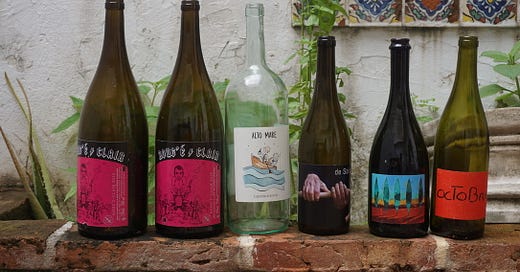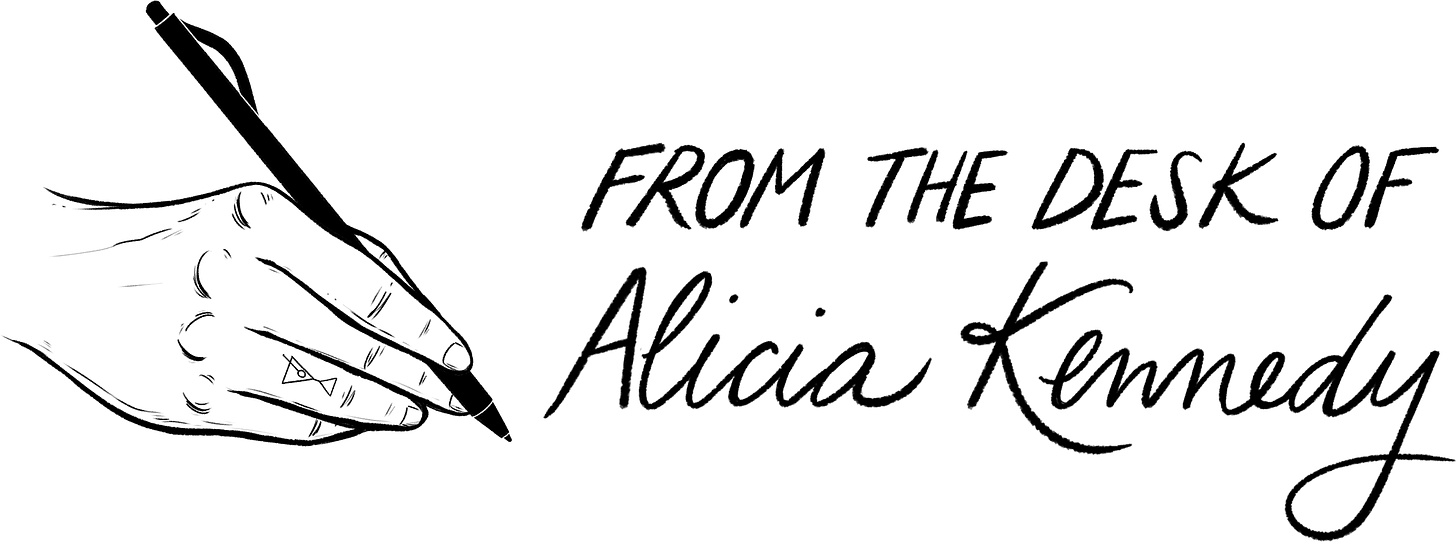The extended one-on-one interview is a favorite form of mine, which was made clear when I realized I’ve done over 100 podcast episodes with various folks in food and culture since 2018. It’s one that can go very well or very poorly; it presents the interviewer intellectually naked. If the prep was insufficient, there’s no hiding. This is why it’s also stressful, exhausting. But in doing them, I’ve truly learned how to talk and a new way to learn.
Intense social anxiety struck me at the start of adolescence; I’d been an enthusiastic and gregarious child prior. My voice came to exist primarily in writing, except with best friends: I knew I actually liked someone if I could talk to them without feeling like there was a rock in my throat. A girl on a softball team once told me, though, “You’re not shy. You’re quiet,” which was astute. I think this is why I like to do interviews (despite no longer being quiet): They give me a structure for conversation. When the person I’m interviewing turns a question back onto me, that’s when I might feel the old panic creep up and go into a sort of fugue state. Through interviewing, though, and through being a writer who’s had to at least give a picture of confidence, I’ve come to be more confident in conversation. It’s become one of my best tools, a place for space and nuance, for breathing through life and ideas.
Interviews have not always been easy, but I’ve only had one person who treated me like a complete fool not worthy of their time. From sharing this experience, it seems rather commonplace: Every journalist and writer has a story of the one person who needed their interview thrown in the digital trash, who came to them in bad faith. (I’m talking of culture writing, clearly, as there are different standards for reporting on trauma.)
Lauren Cocking runs the blog Leyendo LatAm, where she talks to translators of literary fiction and poetry.
“I've learnt that interviews require a give and take, which some interviewees are not willing to give,” Cocking tells me over email. “For example, I read and research and prepare extensively for each interview, but some people appear not to have read my blog at all, which can be...awkward when they ask what my project is about or who I'm interviewing them for. Note: this, thankfully, does not happen often.”
Generally, it’s true, people are generous, and it’s generosity that I believe is the way everyone should go into interviews, on both sides. I’ll admit that I once went on a podcast without listening to it first during an emotionally trying time, and I’ll never do that again—it wasn’t generous!
Usually, though, when I’m being interviewed, because I’ve been on the other side so often, I try my best to entertain and give good insights; I don’t like having any conversation with another person where I haven’t made them laugh, and so I do my best to get people laughing. This is usually easy because I’m from Long Island and to people from other places, I’m already more honest and expressive than most. I truly think nothing of telling people how I really feel, especially after years of quiet.
“I've actually learnt a staggering amount by doing the interviews that I do, and have been able to open doors to places I thought inaccessible in terms of the translation world,” adds Cocking. “And it should be noted that the vast majority of those I've spoken to have been absolutely generous with both their time and advice.”
When writing for outlets or interviewing folks for these essays, interviews are easy. They’re extremely structured and focused, and so long as the person on the other end is interested in talking, they’re generally fruitful. I can’t think of an interview I’ve done for reporting that yielded nothing useful, no good quotes.
For the podcast, things can get thorny, though that’s thankfully rare. There’s an idea that’s gotten traction on social media that suggests every exchange of time is equivalent to an exchange of labor, and that has given things we used to take for granted a sheen of the transactional. I like to do interviews and be interviewed because I view it as contributing to cultural conversations and giving insight into creativity, work, and general humanity. As I said, I view it as an act of generosity—not just between the people talking, but with the audience that is listening or reading.
I don’t approach these interviews as “interviews,” necessarily. That’s why I call them “conversations,” though I wonder if in doing so I’m giving myself too much credit. I love when there is a natural rapport, but let’s be honest: that’s rare. I do approach interviews as a space of learning, and though I always do my research, I will absolutely never know everything about the subject (unless one day my middle school crush, singer-songwriter Duncan Sheik, comes on—but even then), and this brings up how much anyone really knows about public figures.
You have to be prepared for the subject to know nothing about you and not to regard you as all that significant, too, and that has to guide the questions, the attitude, the tone. You have to be a bit of a blank canvas while also being recognizable to your core audience, reacting for them. There is a lot of preparation for every one of these, in order to make them feel organic and stay upbeat. Until someone is a superstar, each interview is both an introduction and attempt at hitting new depths. This is the balance.
I like the conversation format that I do for the reason that it is not editorialized, not edited: It is a transcript of what exactly transpired, except for interruptions or non sequiturs. Whereas a feature or profile will, by necessity, put a subject in a neat box with a pretty bow, an interview or conversation can be a lot more honest. There can be a little bit of mess, as there can be in any human exchange.
But people have to trust you to be generous with you, and I’ve realized that though it hurts my feelings, I don’t always already have the trust of every person on the planet. The models, for me, of the one-on-one audio interview are—of course—Marc Maron of “WTF” and Michael Silverblatt of “Bookworm.” I have become a more recent lover of Maris Kreizman’s “The Maris Review,” as well.
I listened recently to Maron talk to Julie Delpy, because I love her and her work, and this time I was paying attention to the details of Maron’s own line of questioning. Doing this was actually pretty fascinating, because Maron asks short questions sometimes, kind of bursts in, to make sure the listener has the full context. “Where did you study film?” Easy little questions that likely he knows the answers to because of prep, but that I would feel terrible asking in an interview, because the person would assume I hadn’t done any research. But there’s a reason “WTF” has been so successful, and it’s that even with these little questions—or because of them—the listener gets to learn more about the subject than without them. Listening like this led to me asking myself, Am I overthinking? Am I asking ridiculous questions by not wanting to ask obvious questions?
By doing now 30 interviews in this format per year, I’m setting myself up for some challenging hours. I can admit that I like that challenge and can only hope the conversations don’t feel like a waste of time for the other person. I can admit that the bigger my audience, the more challenging the interview space feels—the more pressure there is on me to perform.
In a 2015 profile of Terry Gross in the Times, I read what she says to the author of a memoir off the air before they begin:
‘‘If I ask you anything too personal — I know your book is personal, but say I cross a line, just tell me, and we’ll move on,’’ she said to Hepola. ‘‘And you can tell me anything on the record or off the record. O.K.? Swell.’’
I think this is the lesson I’ve learned now after a few years of intensive interviewing, which is that I need to add some rules and not be so casual. I need to lay the foundation for comfort and intimacy and not assume it, and perhaps through doing so I am also creating a base of comfort from which I can jump in with those little questions for better context without insulting the other person. I need to ask people if there are pieces they’d like me to read beforehand, topics they don’t want to discuss; I need to let them know they can draw a line at any moment. I send questions in advance, but that’s not enough. Harder still is that it’s been so long since I’ve interviewed someone in person. Virtually, it’s harder to cultivate a spark.
Now through deeper consideration, I know that nothing in the interview context should be taken for granted. As I said: I spent years not being great at talking to people, and now I’m making up for the lost time.
Last Wednesday’s podcast featured Sarah Lohman, author of Eight Flavors: The Untold Story of American Cuisine. This week, it’s the incredible Sandor Katz—the fermentation revivalist behind the classic books Wild Fermentation and The Art of Fermentation—discussing his new book, Sandor Katz’s Fermentation Journeys and how he practices “humble geography.” Subscribe on Apple Podcasts or adjust your settings to receive an email when it’s out.
Friday’s From the Kitchen for paid subscribers will continue the three-week pantry guide, with a list of my favorite spices and standard dry goods. See the recipe index for all past recipes available to paid subscribers.
Published:
Oh boy, did I work on a REALLY EXCITING piece last week that I can’t wait for you to read!!! I’ve got more deadlines looming, too, and I’m thrilled about it—if a bit tired, to be honest.
Interviews galore, though: Talked to this SXSW Audible podcast “Futurology” about—guess what?—the future of food. Talked to “Blueprint for Living” on Australia’s ABC radio about the meaning of “plant-based.” Talked to Passion of the Weiss, a hip-hop blog, about being “the most dangerous woman in food writing” (lol) for which I was WILDLY HONEST for some reason!
Reading:
My Struggle Book 5, still, of course. Chilean Poet: A Novel by Alejandro Zambra, still—it is fantastic. And for research, Angela Garbes’s Like a Mother: A Feminist Journey Through the Science and Culture of Pregnancy and forthcoming Essential Labor: Mothering as Social Change! She is a future podcast guest. Leave a comment, if you have questions for her.
Cooking:
I really enjoyed making Meera Sodha’s naan via New York Times Cooking, where I replaced yogurt with coconut milk hit with the juice of half a lemon and the milk with more coconut milk. It came out really nice. I love flatbreads. Please tell me your favorite flatbread recipes or, even better, flatbread COOKBOOKS! Pictured above is the damage we did at my husband’s birthday party.






Good piece. Interviewing is a craft, to be sure. I found it so nerve-wracking in my younger years. Only eased into it over many years and through constant practice. BEING interviewed came naturally, because I already knew from personal experience what the interviewer wanted and tried to give it to them.
Helpful insights on the science and art of the interview. I liked that Julie Delpy interview, too. It was open-hearted on both sides of the conversation.